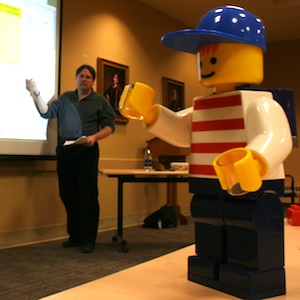Crowd Funding

|
Lego Serious Play Initiative
|
|
Lego Serious Play Initiative
LEGO — the Danish toy company of LEGO bricks fame — has a business consulting model called LEGO SERIOUS PLAY. This model has been “open-sourced” meaning anyone can leverage it for strategic management consulting and planning, training and development, and so forth.
The University of Guelph prides itself on delivering an innovative, hands-on approach to business from things like the award-winning “Introduction to Business” course and the Micro-Tyco Challenge, to the Gryphons’ Den entrepreneurial pitch competition. This crowdfunding initiative continues this tradition — to bring LEGO SERIOUS PLAY to the classrooms of future business leaders.
Your contributions will pay for forty specialized LEGO kits for the Transformational Learning Classroom as well as the certification training for Prof. Trent Tucker to bring the LEGO SERIOUS PLAY experience to the first year “Introduction to Business” course and the fourth-year “Strategic Management” capstone courses.
Let's use LEGO SERIOUS PLAY for developing team-building, communication, ideation, and brainstorming skills for the University of Guelph business students of today and the “Leaders for a Sustainable World” of tomorrow!
Teaching With LEGO:
I first started using LEGO in the classroom when I was teaching about Learning Curves for a third-year Operations Management course. I bought 10 LEGO fire trucks from my local toy store and brought them to class. Students recorded their initial build time, we talked about the theory while they dismantled the trucks, they recorded their second build time, and we calculated their learning rates. Even before the class had ended they were texting their friends in the incoming class with the times to beat! I went on to order another 15 fire trucks so even more students in class could participate hands on and we would have a more robust set of data to talk about as a class.
Now that I had 25 fire trucks, I thought of other ways to leverage them in that same Operations Management course. We used the LEGO fire trucks to model key ideas behind assembly-line balancing by having various stations where the wheels were attached to the chassis. We used them again in a total quality control lecture about finding and fixing defects. The key pedagogical advantage to using LEGO in the classroom is that theoretical concepts are made real when a team of students is assembling LEGO fire trucks and tracking their time to examine learning curve effects or seeing work-in-process product build up on an unbalanced assembly line. In addition to my fleet of 25 fire trucks, I have forty custom sets of 84 bricks for building tables and chairs as part of a naïve introduction to linear programming and mathematical optimization called “The Monochromatic Furniture Company.” This is an upgrade to the “LEGO of my Simplex” I had been using previously. As part of my Certificate in University Teaching, I wrote a paper at the University of Waterloo about teaching with LEGO. This crowdfunding initiative is the next step — I like to call it the “LEGO-ification” of MGMT*1000!
Social Media:
You can follow me, Professor Trent Tucker on Twitter: @ProfTucker. Thanks!
| Lego Serious Play Initiative |
|---|
| Trent Tucker |
| Denotes a Team Captain |

